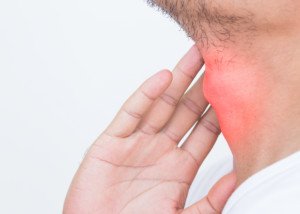
You already know that the “lump in the throat” can be caused by LPR or acid reflux, but here’s WHY this occurs.
LPR is actually acid reflux that makes it up to the throat.
A well-established symptom or result of LPR is the sensation of a lump in the throat.
But what is it about LPR that makes the patient experience this “feeling”?
“One can feel like they have a mass in the throat, and it is hard to swallow and food is getting stuck,” begins Dr. Stacey Silvers, MD, of Madison ENT & Facial Plastic Surgery in NYC, who is board certified in otolaryngology—the specialty of the ears, nose and throat. ENT physicians deal a lot with LPR (laryngeal pharyngeal reflux).
“That feeling of a lump in the throat is a physical swelling from irritating-stomach acid reaching up into the throat.
“If all patients with acid reflux presented with heartburn and indigestion, the diagnosis would be easy.
“As a result patients would take over the counter reflux medication for their uncomfortable ‘classic’ reflux symptoms.”
But not all patients have the classic symptom of heartburn from their acid reflux.
The symptoms can bypass the stomach and chest area and be felt only in the throat.
LPR Scares Many Patients
“The fear in most is that this lump is a tumor,” says Dr. Silvers.
“The area in the throat that is inflamed and swollen is at the opening of the esophagus which sits behind the vocal cords at the level of the thyroid cartilage in the neck.
“As a result of this swelling, other associated symptoms like hoarseness, shortness of breath, post-nasal drip, cough and throat-clearing are also common symptoms.”
Dr. Silvers adds that this area requires examination with a fiberoptic scope.
Typically a patient will come into the doctor’s office and be diagnosed with allergies or asthma, especially if they complain of shortness of breath or a sensation that not enough air is getting through when they inhale.
“But allergy medications and asthma inhalers are not working,” says Dr. Silvers.
“In most cases the diagnosis is not correct, and the underlying cause of all of the symptoms is missed.”
LPR is also known as “silent reflux” because, as mentioned, it bypasses the classic symptoms that millions of people feel in their chest and upper stomach, and presents as various throat symptoms, including that lump feeling.
Here are Dr. Silvers’ recommended natural and drug treatments for LPR relief.

 An NYC expert in ear, nose and throat care,
An NYC expert in ear, nose and throat care, 







































